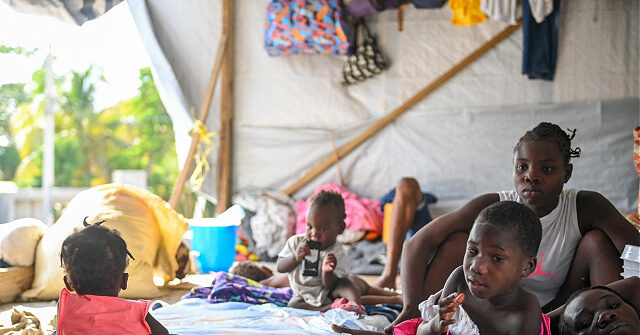Top News
U.N.: Gangs Pushing Millions in Haiti to Famine Through Blockades

The U.N. World Food Program (WFP) reports that five million Haitians do not get enough food every day, and two million of them are on the verge of starvation.
According to an ABC News report on Monday, this humanitarian crisis is being made worse by gangs, which have blockaded vital highways to deliberately create famine conditions.
Haiti’s notorious gang warlords are interfering with shipments of humanitarian aid and even with the delivery of food grown in Haiti. The only highway leading to Haiti’s breadbasket province of Artibonite is “entirely controlled by gangs.”
ABC described, “a series of checkpoints manned often by drunk gang members still in their teens, the AK-47s slung over their shoulders significantly older than they are.”
Air travel can bring a few passengers past the blockades, but large ground shipments of produce are impossible, so the farmers of Artibonite are watching mountains of fruit and vegetables rot while children in other parts of Haiti starve.
Haiti has a semi-formalized food distribution network called Madan Sara, the subject of a 2021 documentary of the same name. The Madan Sara is a league of women who specialize in buying and selling food farmed by the men of Haiti, although they style themselves as “socialists” or “anti-capitalists.”
Siblings Mylouise Veillard, left, and Myson walk home with water they collected from a well, for cooking, cleaning and drinking, in a rural area of Saint-Louis-du-Sud, Haiti, Thursday, May 25, 2023. (AP Photo/Odelyn Joseph)
However confused they might be about the meaning of the word “capitalism,” the female merchants of the Madan Sara network have a reputation for resilience and resourcefulness, continuing their business through Haiti’s many periods of political upheaval — until now.
According to ABC’s report, the gangs blockading Artibonite have assaulted and kidnapped Madan Sara traders, holding some of them for hefty ransoms their families must pay in installments.
A growing number of female food sellers have abandoned the markets, fearing gang violence. The WFP has attempted to set up temporary markets in safe districts only to see its warehouses ransacked and burned.
“You get suicidal thoughts, you want to do bad things to yourself. If I die today, I won’t have any regrets,” one of the dejected kidnapping victims told ABC.
The WFP said on Monday that it was obliged to reduce the number of Haitians receiving food assistance by 25 percent in July, or about 100,000 people. The WFP said that its funding shortage would leave 750,000 Haitians without urgently needed food assistance by the end of the year.
“It’s tragic being unable to reach some of the most vulnerable Haitians this month. These cuts could not come at a worse time, as Haitians face a multi-layered humanitarian crisis, their lives and livelihoods upended by violence, insecurity, economic turmoil and climate shocks. Unless we receive immediate funding, further devastating cuts cannot be ruled out,” said WFP Director for Haiti Jean-Martin Bauer.
“This isn’t the time to cut back. It’s the time to step up. We can’t let Haitians down when they need us the most,” Bauer said.
Some Haitians are angry that the international community is not doing more to help but, given the gang blockades and the assaults on United Nations operations, it is difficult to see how anything short of a military intervention to stabilize the country and keep its roads open would help.
The U.N. has called for such an intervention ever since the assassination of President Jovenel Moise plunged the already struggling country into total chaos two years ago, but no regional state or world power is eager to send troops into the Haitian quagmire, including the United States.
The first solid commitment to security assistance came on Sunday when Kenya offered to send a thousand police officers to “train and assist the Haitian police,” but even that offer is pending approval by the Kenyan government and the United Nations.
The UK Guardian noted in July that “some civil society groups have been forced to leave Haiti due to security concerns or the inability to send supplies through gang-controlled ports in the capital of Port-au-Prince.”
The WFP warned in July that its assistance program for Haiti is only 16 percent funded for the year. The WFP is supported directly by contributing nations, not funds from the U.N. general budget, so the shortfall of funding for Haiti produced some angry responses and finger-pointing.
“If the World Food Program cannot provide nutritional support to Haitians in their country’s current, deplorable situation, why does it even exist? The international community is largely responsible for Haiti’s catastrophe, yet the whites aren’t helping Haitians in their time of absolute need,” Ambassador Dan Foote, former Biden administration envoy to Haiti, said in July.
“If WFP needs leadership that’s unafraid to do the right thing, they can call me,” said Foote, who tendered his resignation to Secretary of State Antony Blinken in September 2021 because he was angered by the deportation of Haitian refugees and illegal migrants.
Read the full article here








